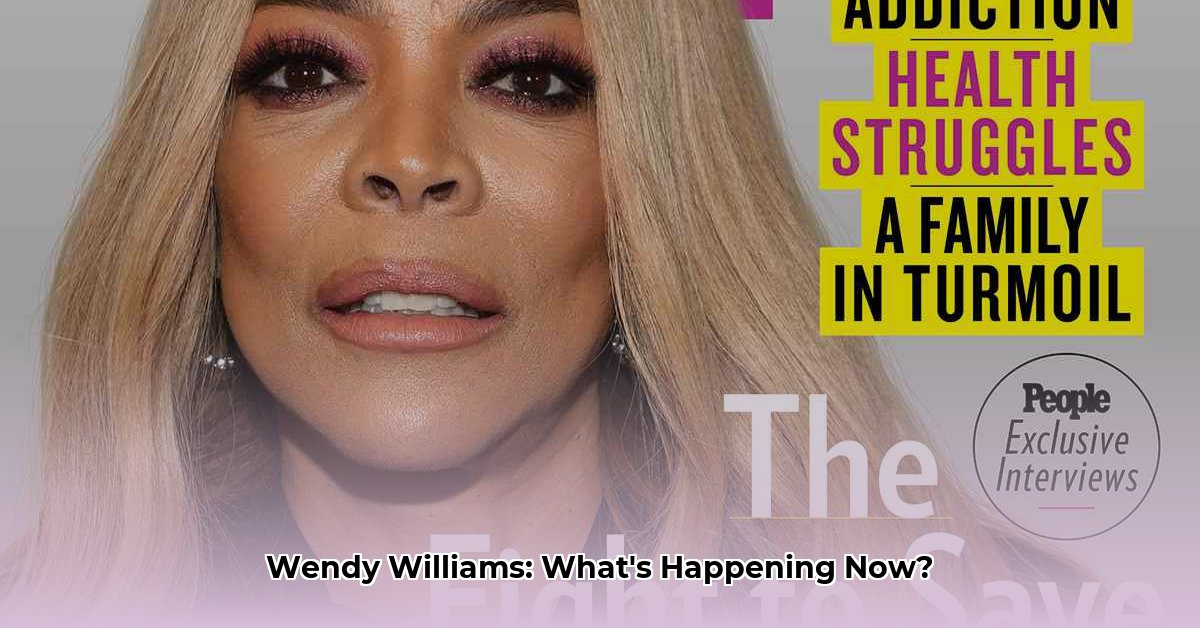The Battle for Autonomy
Wendy Williams, the once-vibrant talk show host, finds herself embroiled in a protracted legal battle over her own life. Placed under guardianship in 2022, Williams has publicly decried the arrangement as a “prison,” claiming isolation from family and undue restrictions on her freedom. This in-depth report examines the circumstances surrounding the guardianship, analyzes Williams’ claims, and explores the broader implications of this complex case.
From Daytime TV to Legal Battles: How Did We Get Here?
Williams’ journey from a prominent media personality to a woman fighting for autonomy began with health challenges. Diagnosed with both frontotemporal dementia and primary progressive aphasia, conditions that impact cognitive function, particularly language and behavior, Williams faced mounting concerns about her well-being. These diagnoses, coupled with concerns raised by Wells Fargo regarding her financial stability, led the court to appoint Sabrina E. Morrissey, a lawyer specializing in trusts, estates, and guardianships, to oversee Williams’ affairs.
This intervention, intended to protect Williams, quickly became a point of contention. Morrissey’s court filings depicted a significantly impaired individual, suggesting a permanent inability to manage her own affairs. Williams, however, vehemently disputes this portrayal, asserting her mental competence and decrying the guardianship as a form of confinement.
Wendy Williams’ Perspective: A Life Under Control
Williams’ public statements offer a glimpse into her experience under guardianship. In interviews, including a candid conversation on The Breakfast Club in January 2025, she described her living situation as a “luxury prison,” alleging restricted communication with family, limited access to technology, and constant monitoring. These claims are echoed by her niece, Alex Finnie, who has expressed concern about Williams’ isolation and the restrictions placed on her contact with loved ones.
Inside the Courtroom: Legal Arguments and Conflicting Narratives
The legal proceedings surrounding Williams’ guardianship are shrouded in complexity. Morrissey’s lawsuit against A&E and Lifetime over their docuseries, “Where Is Wendy Williams?” alleging exploitation of a vulnerable individual, further complicates the legal landscape. The networks’ countersuit adds another layer to the legal battle, making it even more challenging to discern the facts. Central to the legal dispute is the question of Williams’ mental capacity. Court documents reportedly cite early-onset dementia and aphasia as justification for the guardianship, while Williams maintains she is mentally sound and capable of managing her own life.
Family Testimony: Corroborating Claims of Isolation
Adding weight to Williams’ claims, family members, notably her niece, Alex Finnie, have publicly voiced concerns about the restrictions imposed upon her. Finnie’s description of Williams’ living situation as a “luxury prison,” echoing Williams’ own words, suggests that while the environment may be comfortable, it comes at the cost of freedom and autonomy.
The Bigger Picture: Guardianship, Autonomy, and the Potential for Abuse
Williams’ case underscores broader concerns about the guardianship system. While designed to protect vulnerable individuals, the potential for abuse and undue restriction of personal freedom raises critical questions about its implementation and oversight. How do we balance the need for protection with the right to self-determination? When does care become control? These are the questions brought to the forefront by Williams’ fight for autonomy. The #FreeWendy movement, an online campaign advocating for Williams’ right to self-determination, highlights public concern over the potential misuse of guardianship.
Where Do We Go From Here?
The legal battle over Wendy Williams’ guardianship continues, leaving her future uncertain. Will the court recognize her pleas for autonomy? Will the system designed to protect her ultimately restrict her freedom? This case serves as a critical reminder of the delicate balance between safeguarding vulnerable individuals and preserving their fundamental right to make their own choices.
Key Players
| Key Player | Role |
|---|---|
| Wendy Williams | Former Talk Show Host, Under Guardianship |
| Sabrina E. Morrissey | Williams’ Court-Appointed Guardian |
| Alex Finnie | Williams’ Niece |
| Wells Fargo | Initiated asset freeze |
Understanding the Medical Complexities
Williams’ diagnoses of frontotemporal dementia and primary progressive aphasia add another layer of complexity to her case. Frontotemporal dementia (FTD) primarily affects the frontal and temporal lobes of the brain, responsible for personality, behavior, and language. Primary progressive aphasia (PPA), a form of FTD, specifically impairs language skills. These conditions require specialized care and understanding, making it crucial to consider their impact on Williams’ situation.
The Public Eye and the #FreeWendy Movement
The public’s interest in Williams’ case has fueled the #FreeWendy movement, an online campaign advocating for her autonomy and questioning the necessity and scope of the guardianship. This movement underscores public concern about the potential for guardianship to be misused and emphasizes the need for transparency and accountability.
Important Considerations
- Conflicting narratives: While Williams maintains she is competent, court documents suggest otherwise, highlighting the inherent difficulty in assessing cognitive capacity.
- Transparency and access: Limited public access to court proceedings and medical records fuels speculation and raises questions about the balance between privacy and the public’s right to know.
- Financial concerns: Allegations of restricted access to funds and the sale of Williams’ assets raise questions about financial management within the guardianship.
- Ethical implications: Williams’ case underscores the broader ethical considerations surrounding guardianship and the potential conflict between protection and autonomy.
This ongoing legal battle serves as a stark reminder of the complexities of guardianship and the importance of protecting the rights and dignity of those under its purview. It remains to be seen how this case will unfold, but it undoubtedly highlights the need for ongoing dialogue and potential reform within the guardianship system.







